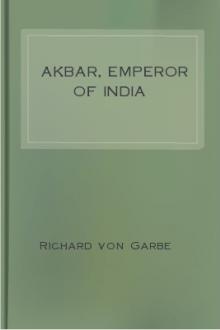Akbar, Emperor of India, Richard von Garbe [ebook offline .txt] 📗

- Author: Richard von Garbe
- Performer: -
Book online «Akbar, Emperor of India, Richard von Garbe [ebook offline .txt] 📗». Author Richard von Garbe
Among other ways Akbar betrayed the scientific trend of his mind by sending out an expedition in search of the sources of the Ganges.[29] That a man of such a wonderful degree of versatility should have recognized the value of general education and have devoted himself to its improvement, we would simply take for granted. Akbar caused schools to be erected throughout his whole kingdom for the children of Hindus and Mohammedans, whereas he himself did not know how to read or write.[30] This remarkable fact would seem incredible to us after considering all the above mentioned facts if it was not confirmed by the express testimony of his son, the Emperor Jehângir. At any rate for an illiterate man Akbar certainly accomplished an astonishing amount. The universal character of the endowments of this man could not have been increased by the learning of the schools.
AKBAR'S GRAVE.
I have now come to the point which arouses most strongly the universal human interest in Akbar, namely, to his religious development and his relation to the religions, or better to religion. But first I must protest against the position maintained by a competent scholar[31] that Akbar himself was just as indifferent to religious matters as was the house of Timur as a whole. Against this view we have the testimony of the conscientiousness with which he daily performed his morning and evening devotions, the value which he placed upon fasting and prayer as a means of self-discipline, and the regularity with which he made yearly pilgrimages to the graves of Mohammedan saints. A better insight into Akbar's heart than these regular observances of worship which might easily be explained by the force of custom is given by the extraordinary manifestations of a devout disposition. When we learn that Akbar invariably prayed at the grave of his father in Delhi[32] before starting upon any important undertaking, or that during the siege of Chitor he made a vow to make a pilgrimage to a shrine in Ajmir after the fall of the fortress, and that after Chitor was in his power he performed this journey in the simplest pilgrim garb, tramping barefooted over the glowing sand,[33] it is impossible for us to look upon Akbar as irreligious. On the contrary nothing moved the Emperor so strongly and insistently as the striving after religious truth. This effort led to a struggle against the most destructive power in his kingdom, against the Mohammedan priesthood. That Akbar, the conqueror in all domains, should also have been victorious in the struggle against the encroachments of the Church (the bitterest struggle which a ruler can undertake), this alone should insure him a place among the greatest of humanity.
The Mohammedan priesthood, the community of the Ulemâs in whose hands lay also the execution of justice according to the dictates of Islam, had attained great prosperity in India by countless large bequests. Its distinguished membership formed an influential party at court. This party naturally represented the Islam of the stricter observance, the so-called Sunnitic Islam, and displayed the greatest severity and intolerance towards the representatives of every more liberal interpretation and towards unbelievers. The chief judge of Agra sentenced men to death because they were Shiites, that is to say they belonged to the other branch of Islam, and the Ulemâs urged Akbar to proceed likewise against the heretics.[34] That arrogance and vanity, selfishness and avarice, also belonged to the character of the Ulemâs is so plainly to be taken for granted according to all analogies that it need hardly be mentioned. The judicature was everywhere utilized by the Ulemâs as a means for illegitimate enrichment.
This ecclesiastical party which in its narrow-minded folly considered itself in possession of the whole truth, stands opposed to the noble skeptic Akbar, whose doubt of the divine origin of the Koran and of the truth of its dogmas began so to torment him that he would pass entire nights sitting out of doors on a stone lost in contemplation. The above mentioned brothers Faizî and Abul Fazl introduced to his impressionable spirit the exalted teaching of Sûfism, the Mohammedan mysticism whose spiritual pantheism had its origin in, or at least was strongly influenced by, the doctrine of the All-One, held by the Brahman Vedânta system. The Sûfi doctrine teaches religious tolerance and has apparently strengthened Akbar in his repugnance towards the intolerant exclusiveness of Sunnitic Islam.
The Ulemâs must have been horror-stricken when they found out that Akbar even sought religious instruction from the hated Brahmans. We hear especially of two, Purushottama and Debî by name, the first of whom taught Sanskrit and Brahman philosophy to the Emperor in his palace, whereas the second was drawn up on a platform to the wall of the palace in the dead of the night and there, suspended in midair, gave lessons on profound esoteric doctrines of the Upanishads to the emperor as he sat by the window. A characteristic bit of Indian local color! The proud Padishah of India, one of the most powerful rulers of his time, listening in the silence of night to the words of the Brahman suspended there outside, who himself as proud as the Emperor would not set foot inside the dwelling of one who in his eyes was unclean, but who would not refuse his wisdom to a sincere seeker after truth.
Akbar left no means untried to broaden his religious outlook. From Gujerat he summoned some Parsees, followers of the religion of Zarathustra, and through them informed himself of their faith and their highly developed system of ethics which places the sinful thought on the same level with the sinful word and act.
From olden times the inhabitants of India have had a predisposition for religious and philosophical disputations. So Akbar, too, was convinced of the utility of free discussion on religious dogmas. Based upon this idea, and perhaps also in the hope that the Ulemâs would be discomfited Akbar founded at Fathpur Sikrî, his favorite residence in the vicinity of Agra, the famous Ibâdat Khâna, literally the "house of worship," but in reality the house of controversy. This was a splendid structure composed of four halls in which scholars and religious men of all sects gathered together every Thursday evening and were given an opportunity to defend their creeds in the presence and with the cooperation of the Emperor. Akbar placed the discussion in charge of the wise and liberal minded Abul Fazl. How badly the Ulemâs, the representatives of Mohammedan orthodoxy, came off on these controversial evenings was to be foreseen. Since they had no success with their futile arguments they soon resorted to cries of fury, insults for their opponents and even to personal violence, often turning against each other and hurling curses upon their own number. In these discussions the inferiority of the Ulemâs, who nevertheless had always put forth such great claims, was so plainly betrayed that Akbar learned to have a profound contempt for them.
In addition to this, the fraud and machinations by means of which the Ulemâs had unlawfully enriched themselves became known to the Emperor. At any rate there was sufficient ground for the chastisement which Akbar now visited upon the high clergy. In the year 1579 a decree was issued which assigned to the Emperor the final decision in matters of faith, and this was subscribed to by the chiefs of the Ulemâs,—with what personal feelings we can well imagine. For by this act the Ulemâs were deprived of their ecclesiastical authority which was transferred to the Emperor. That the Orient too possesses its particular official manner of expression in administrative matters is very prettily shown by a decree in which Akbar "granted the long cherished wish" of these same chiefs of the Ulemâs to undertake the pilgrimage to Mecca, which of course really meant a banishment of several years. Other unworthy Ulemâs were displaced from their positions or deprived of their sinecures; others who in their bitterness had caused rebellion or incited or supported mutiny were condemned for high treason. The rich property of the churches was for the most part confiscated and appropriated for the general weal. In short, the power and influence of the Ulemâs was completely broken down, the mosques stood empty and were transformed into stables and warehouses.
Akbar had long ceased to be a faithful Moslem. Now after the fall of the Ulemâs he came forward openly with his conviction, declared the Koran to be a human compilation and its commands folly, disputed the miracles of Mohammed and also the value of his prophecies, and denied the doctrine of recompense after death. He professed the Brahman and Sûfistic doctrine that the soul migrates through countless existences and finally attains divinity after complete purification.
The assertion of the Ulemâs that every person came into the world predisposed towards Islam and that the natural language of mankind was Arabic (the Jews made the same claim for Hebrew and the Brahmans for Sanskrit), Akbar refuted by a drastic experiment which does not correspond with his usual benevolence, but still is characteristic of the tendency of his mind. In this case a convincing demonstration appeared to him so necessary that some individuals would have to suffer for it. Accordingly in the year 1579 he caused twenty infants to be taken from their parents in return for a compensation and brought up under the care of silent nurses in a remote spot in which no word should be spoken. After four years it was proved that as many of these unhappy children as were still alive were entirely dumb and possessed no trace of a predisposition for Islam.[35] Later the children are said to have learned to speak with extraordinary difficulty as was to be expected.
Akbar's repugnance to Islam developed into a complete revulsion against every thing connected with this narrow religion and made the great Emperor petty-souled in this particular. The decrees were dated from the death of Mohammed and no longer from the Hejra (the flight from Mecca to Medina). Books written in Arabic, the language of the Koran were given the lowest place in the imperial library. The knowledge of Arabic was prohibited, even the sounds characteristically belonging to this language were avoided.[36] Where formerly according to ancient tradition had stood the word Bismilâhi, "in the name of God," there now appeared the old war cry Allâhu akbar "God is great," which came into use the more generally—on coins, documents, etc.—the more the courtiers came to reverse the sense of the slogan and to apply to it the meaning, "Akbar is God."
Before I enter into the Emperor's assumption of this flattery and his conception of the imperial dignity as conferred by the grace of God, I must speak of the interesting attempts of the Jesuits to win over to Christianity the most powerful ruler of the Orient.
As early as in the spring of 1578 a Portuguese Jesuit who worked among the Bengals as a missionary appeared at the imperial court and pleased Akbar especially because he got the better of the Ulemâs in controversy. Two years later Akbar sent a very polite letter to the Provincial of the Jesuit order in Goa, requesting him to send two Fathers in order that Akbar himself might be instructed "in their faith and its perfection." It is easy to imagine how gladly the





Comments (0)